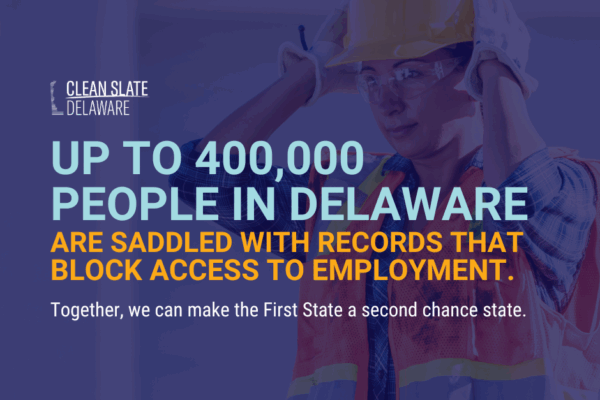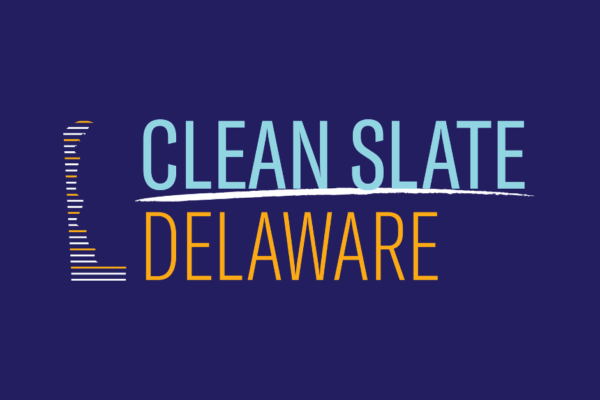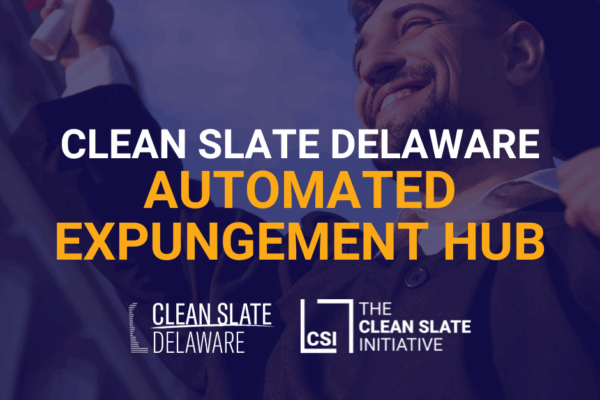WILMINGTON — Today, the Clean Slate Delaware Campaign (CSDE) announced the launch of its Clean Slate hub site, CleanSlateDE.org— a comprehensive digital tool for expungement related information, events, and resources—at the Visions of Justice conference hosted by Delaware Center for Justice. The launch begins the countdown to Delaware’s Clean Slate law implementation set to begin in August 2024. The Clean Slate law will provide greater equity, consistency, and cost-effectiveness through a streamlined automated expungement process that applies to all eligible Delaware records. CleanSlateDE.org is the latest in a series of advocacy and education efforts CSDE has led since the passage of Delaware’s Clean Slate legislation in 2021.
The Clean Slate Delaware campaign works to expand access to second chances by ensuring that people living with a Delaware record are aware of eligibility requirements, updated laws, and how they can start the process of clearing eligible records. “For people living with a record in Delaware, Clean Slate's implementation can’t come soon enough,” said John Reynolds, Deputy Policy & Advocacy Director at the ACLU of Delaware, “Records are a substantial barrier to many life-sustaining goals, like finding a place to live and a good job. That’s why it's so important we address any obstacles to successful implementation now, before they become a barrier down the road. Efforts like CleanSlateDE.org—a place where anyone can go to receive consolidated, accessible, and accurate information about the automated expungement process—will help ensure implementation is as smooth as possible for the people who need that relief.”
Delaware joins twelve states across the country that have passed laws that meet Clean Slate criteria: automation of record clearance, automatic clearance upon eligibility of the record, inclusion of arrest records, inclusion of misdemeanor records, and a strong recommendation for laws to include eligibility of at least one felony record. “Delaware has the honor of being one of the first states that will implement a Clean Slate policy, helping to blaze the trail for Clean Slate across the country,” said Sheena Meade, CEO of The Clean Slate Initiative. “The Clean Slate Initiative applauds the efforts of directly impacted Delawareans, advocates, business leaders, lawmakers, and government officials who are working together to implement the state’s policy. We will continue to support collaboration among Clean Slate stakeholders to ensure an automatic record sealing policy that reflects the broadest interpretation of the Clean Slate Act.”
As of August 24th, Office of Defense Services (ODS) officially launched the pardon/expungement chatbot, featured on the CSDE hub. This chatbot generates potential outcomes based on self-reported information, allowing individuals to learn what types of charges may be eligible for expungement or pardon services. While the chatbot does not offer official legal advice, it does provide an individualized experience for community members. ODS will also be implementing an expungement hotline for community members to call directly to seek expungement/pardon services, in addition to the expungement/pardon portal that currently exists on the ODS website. Community members input their contact information as well as written consent for ODS to view their criminal history, where an attorney will then review each case to determine eligibility of services.
While passing Clean Slate legislation was a good first step, there is still work to do in identifying solutions for the best possible implementation before the process begins next August. CSDE is calling on lawmakers and government officials to develop a robust notification plan for eligible individuals to learn whether their record has been sealed through the automated process. “It’s important to note implementation is not our end goal, but rather an important step towards creating a society in which a record is not a life sentence to poverty and stigma,” said Kailyn Richards, Director of Policy at Delaware Center for Justice, “Beyond developing a notification process, we need elected officials and state agencies to commit to advocating for and enacting policies to eliminate systemic barriers that prevent individuals living with a record and those who have received an expungement from successfully gaining education, employment, housing, credit, and other opportunities.”
Those interested in learning more about the automated expungement process and solutions to ensure successful implementation are invited to join CSDE partners at the next Community Solutions Conversation on Tuesday, November 14 in Wilmington.
CSDE partners include The Clean Slate Initiative, Center for American Progress, ACLU of Delaware, Delaware Center for Justice, Office of Defense Services, Delaware Volunteer Legal Services, Dover District Ministerium–AMEC, HEADS UP 302, and Everlasting Hope Ministries.
Related Content

Second Chances Hiring Can Benefit Us All

Delaware Supreme Court Ruling Expands Formerly Incarcerated Individuals’ Right to Challenge Their Convictions
Stay Informed
Sign up to be the first to hear about how to take action.
By completing this form, I agree to receive occasional emails per the terms of the ACLU’s privacy statement.
By completing this form, I agree to receive occasional emails per the terms of the ACLU’s privacy statement.

